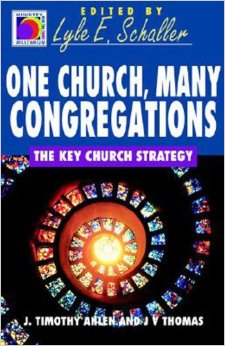Book Review: One Church, Many Congregations, by J. Timothy Ahlen and J. V. Thomas
March 3, 2010

March 3, 2010
A United Methodist publishing house asked two Baptists to write a book about how churches can revolutionize their ministries by becoming one church with many congregations. Kind of sounds like the beginning of a joke or maybe a logic puzzle, doesn’t it?
In fact, it’s the story behind J. Timothy Ahlen and J. V. Thomas’s book One Church, Many Congregations. Ahlen and Thomas wrote their book in order to explain and help other churches implement what they call the Key Church Strategy.” The Key Church Strategy is an evangelism strategy. One church starts other congregations primarily composed of a particular ethnic or cultural group, which may or may not remain a part of the one Key Church.”
The authors spend the first two chapters of the book explaining the biblical and practical foundations of this idea. The last three chapters explain how the Key Church Strategy” relates to community ministry and how Key Church practitioners can best reach out to those who live in mulitihousing,” that is, apartments.
So while the book’s title indicates that it’s primarily about multi-site churches, much of the book focuses on community ministry and evangelistic work in lower-income areas. We’re told that churches should start community outreach missions” and evangelistic meetings that may develop into churches” that either remain under the umbrella of the Key Church or eventually become independent, but little is actually said that’s unique to a multi-site church strategy.
Now, apart from the idea that multiple churches can somehow remain one local church, this is a great idea. Churches should work to cross cultural and ethnic boundaries for the sake of the gospel. And if we’re willing to take the gospel overseas, we should certainly be willing to do this down the street. Also, Ahlen and Thomas rightly insist that the goal of such evangelistic labors should not merely be individual converts, but local churches.
Yet despite the good intentions behind at least some of it, this book is mostly a jumbled collection of personal anecdotes, strategies for community outreach, and practical suggestions about how churches can grow by starting lots of new evangelistic meetings that become churches.
So, rather than criticize the book’s handling of Scripture and understanding of the church, let’s just get to the bottom line: should you read this book? No.
You shouldn’t read this book if . . .
Does that seem too harsh? I’ll make a couple of exceptions:
I know, hardly a ringing endorsement. You should feel safe in passing this one by.